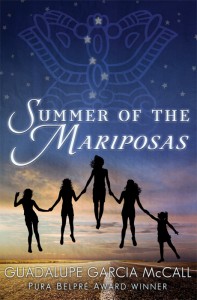Over the weekend, a discussion of diversity in SFF magazines has been brewing in SFF circles. I don’t read many SFF magazines, so I hadn’t been aware of the discussions until Janni Lee Simner pointed someone in the discussion to Tu as an answer for finding diversity in genre. So I won’t address the specifics of a need for diversity in SFF magazines, except to say, yes, it’s important.
Rather, I feel I need to address an article, and a tweet from the author of that article, who takes the position that diversity is “superficial” and therefore unnecessary.
@ghostwritingcow @alannaofdoom Thanks for engaging, guys! I argue that focusing on superficial diversity misses the point of SFF. Disagree?
— Felicity Savage (@felicitysavage) November 30, 2013
 I couldn’t disagree more that diversity in SFF is superficial. In fact, it is at the root of some of the deepest, well-told stories I’ve read. Take Guadalupe Garcia McCall’s Andre Norton–nominated Summer of the Mariposas. It would be an entirely different story if it were set in a Midwestern town starring white girls of European descent, or set in Vancouver or Maine and crossed the U.S.-Canadian border. The entire weave of the worldbuilding is centered around the girls’ identities as both Mexican and American, and the multiple identities that “Mexican” entails—that of both Aztec ancestry and Spanish-influenced Catholicism. The magical people and goddesses the girls meet are straight out of Mexican folklore. There is nothing superficial about anything regarding the Mexican influences within the book.
I couldn’t disagree more that diversity in SFF is superficial. In fact, it is at the root of some of the deepest, well-told stories I’ve read. Take Guadalupe Garcia McCall’s Andre Norton–nominated Summer of the Mariposas. It would be an entirely different story if it were set in a Midwestern town starring white girls of European descent, or set in Vancouver or Maine and crossed the U.S.-Canadian border. The entire weave of the worldbuilding is centered around the girls’ identities as both Mexican and American, and the multiple identities that “Mexican” entails—that of both Aztec ancestry and Spanish-influenced Catholicism. The magical people and goddesses the girls meet are straight out of Mexican folklore. There is nothing superficial about anything regarding the Mexican influences within the book.
Simply changing the color of a character to “blackwash” them for diversity’s sake is far from what anyone who truly advocates for “mirrors, windows, and sliding glass doors” is looking for when we seek more characters of color, LGBT characters, etc. We’re looking for the heart-deep diversity of experiences that so seldom are reflected in science fiction and fantasy. We’re asking for the genre to deepen its idea of “what it means to be human”—a question that SFF excels at asking. Yes, we’re all human and we have common experiences, but how we answer the deepest questions of humanity’s existence vary with culture, ethnicity, religion, country, community. (Are we communal or do we seek individuality? To whom are people loyal? Who is in control? How do we judge goodness?) It has to do with power dynamics and experiences of privilege and the lack thereof, and how privilege is intersectional. And the genre is richer when we explore that full breadth, even when we have dragons and aliens as part of the mix.
Diversity in SFF is about human protagonists that not only welcome readers who might not feel welcome in the genre, but about opening up the world of the reader who isn’t familiar with the culture or personality of a protagonist from a community that hasn’t been as well represented in the past. It’s about awesome worldbuilding, excellent storytelling, and finding inspiration in places that aren’t the same old Western European tropes—tropes we love, sure, but they’ve been overplayed. There are fresh ideas and characters to be found from authors with different perspectives, in places and cultures that haven’t been as well represented.
So for anyone who thinks that diversity is superficial—that the only thing it has to do with is the color of one’s skin—you’re the one missing the point.
Diversity is one of the most important things this genre needs right now, for the sake of great storytelling.